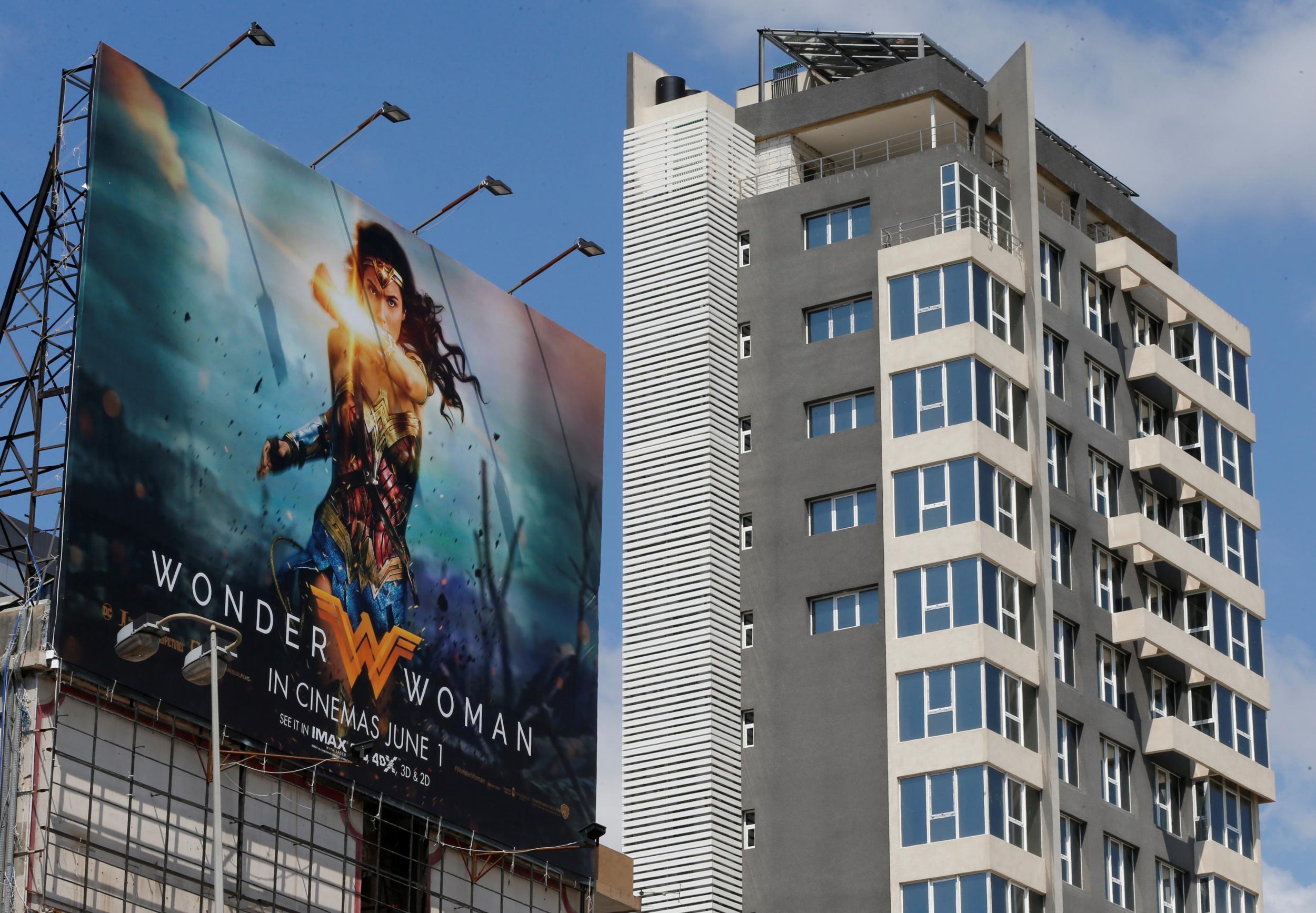Wonder Woman and a dangerous precedent for censorship in Lebanon
Freedom of expression activists worry that banning the latest DC Extended Universe film because of Israeli lead Gal Gadot could set a trend across Lebanese arts and culture

The light is beginning to fade in downtown Beirut on the first Friday of Ramadan.
While the original ancient souk was flattened in the civil war, remnants of medieval walls and the bullet-ridden facades of French influenced mansions remain, jostling with soulless modern buildings.
Between Starbucks, Virgin Megastores and Cinema City, there’s little to distinguish this part of town from any other city in the word – but on a hazy golden evening the plaza outside is a good place for families and teenagers to kill time before it’s dark enough to break their fast.
The cinema is also a favourite for whiling away the hours without thinking about food and drink. Yet moviegoers who had been looking forward to seeing Wonder Woman, the latest offering from Warner Brothers and the DC Extended Comics Universe, have come away disappointed.
“I had to go see a romantic film instead. I was the only boy in the room,” 14-year-old Rami said, grimacing.
On Wednesday the Lebanese authorities officially banned Wonder Woman from cinemas, despite the fact posters advertising the film are dotted around the city, there have been trailers for it before other movies and advance screenings were held on Monday and Tuesday.
An employee at the Beirut Souks Cinema City said that management had taken down posters after an emailed government order, instructing staff to refund people who had bought tickets when they arrived.
Although Lebanon is one of the most liberal countries in the Middle East (ranking 98th out of 180 countries in the World Press Freedom Index) there’s still a lot that doesn’t make it past the government’s censorship bureau. Reasons for banning art, books and other media range from content deemed sexually explicit to work that could inflame sectarian tensions; the only constant is a blanket ban on anything originating from Israel.
The neighbouring countries are technically still at war, and while Lebanon’s censorship laws are vaguely written and outdated, Wonder Woman fell foul of the authorities because the lead – actor Gal Gadot – is Israeli.
Despite the fact films starring Godot in the same role (such as Batman vs Superman) have previously aired in Lebanon without an issue, the hype with which Wonder Woman was anticipated, and Godot’s starring role, brought the film to the General Security’s attention.
“It’s because she’s the main star of this film, it freaked some people out,” said Anthony Sargon, a dual Lebanese-American national who runs The Comic Stash, Beirut’s leading comic bookstore.
“It’s never been an issue before. Natalie Portman is Israeli and all her films come out here. It’s also so unusual to ban something after it’s already come out... The film already made it past the censorship bureau,” he added.
“I think some vocal minority, probably some pressure group, got flustered about it and started putting pressure on the government once they heard about it.”
Godot has attracted particular controversy because she served in the Israeli army. Social media posts from 2006 surfaced recently in which she allegedly proclaimed unequivocal support for Israeli forces in that summer’s war with Hezbollah – a conflict which, although short, killed 1,200 Lebanese civilians and decimated Beirut and south Lebanon’s infrastructure.
“I think it’s a message Lebanon can send to Israel,” passer-by Nawal said outside Cinema City. “It’s not about Gal Gadot as a person. And it’s not about banning anything an Israeli touches, that would be silly.
“But this is a high-profile movie and it is our way of saying, ‘We reject you and your outlook in the same way that in Israel, Arab stuff is banned.’ They censor the deaths of Lebanese and Palestinians all the time.”
General Security, the bureau for censorship, and the state Shura Council did not immediately return The Independent’s requests for comment.
“It’s absurd what happened,” said Gino Raidy, an executive member of MARCH, a Lebanese freedom of expression NGO. “To turn around and retroactively ban something once it has already been given the OK. There’s nothing remotely political about the film.
“It’s kind of good that Wonder Woman has kicked up such a fuss. Warner Brothers will lose some money, sure, but the real victims of the censorship bureau are local Lebanese artists and filmmakers.
“If you want to watch Wonder Woman, you will download it. It’s local art that suffers because it has no other market.”
Lebanon’s decision is unlikely to dent Hollywood profits: the female-directed, critically acclaimed film is expected to smash initial box office predictions to take in $175m (£136m) worldwide.
Many films that get banned on their cinema release are often still sold in Lebanon when they come out on DVD – something Raidy anticipates will happen with Wonder Woman.
“They just don’t look at the big picture. It’s exasperating,” Raidy continued.
“The Israeli ban is a clear example of that. An Israeli person could be the biggest pro-Palestinian activist on the planet, but he and his books and his speeches will be banned here, just because of his birthplace.”
MARCH, like many freedom of expression advocates, is worried that the sudden banning of the film from cinemas ostensibly because of the political views of an actor sets a dangerous precedent for censorship in future.
“I think the censors will be more hawkish after this. It’s a slippery slope,” Comic Stash’s Anthony Sargon said.
“In my opinion it’s totally wrong and it seems the majority of people are against it. If you want to boycott the film, that’s fine, but give people the choice.”
Join our commenting forum
Join thought-provoking conversations, follow other Independent readers and see their replies
Comments